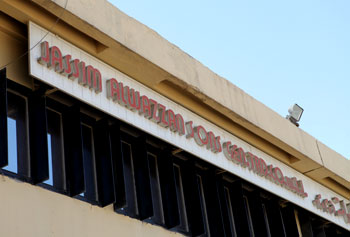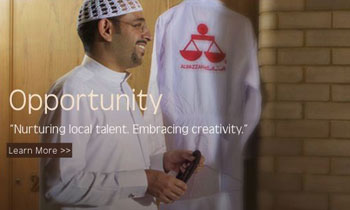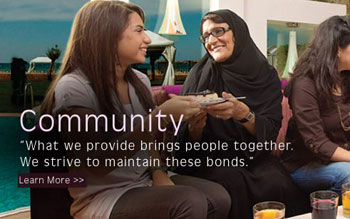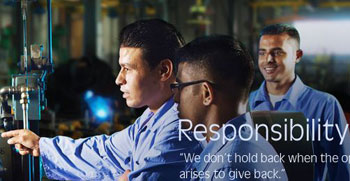Food Retail Industry in Kuwait to Grow by 8%
Interview with Garry Walsh, CEO of Mezzan Holding. I think, the average retail growth was about 16%. You won’t find anywhere in Western Europe or America anything that would match such growth rate. I expect no less than 8% in the next ten years.
It is forecasted that the retail sector, especially in the food area, will expand in the near future. What are your predictions for 2012? Do you think there will be growth in place of the crisis?
I think, the average retail growth was about 16%. You won’t find anywhere in Western Europe or America anything that would match such growth rate. I expect no less than 8% in the next ten years.
Last year, there was huge growth in the sector, largely because of the Emir decree which gave a thousand KD to individuals – man, woman and child – and made subsidized food available for free.
This helped the market a lot, because people suddenly had a lot of money in their pockets unexpectedly. That is why last year retail (especially food retail) went up and the travel industry performed very well. Now we are trying to determine whether that food program is going to stop or whether it is going to continue for another year, and also whether Emir is going to pay people their cash bonus again or not.
So it really is an opportune time. Honestly, the population has gone from 3.4 to 3.6 millions, so you will see very good growth. The question is: will you see extraordinary growth or just good growth?
If you look at most of the developed economies where the population is at best not in decline, it is really hard to beat those trends as a retailer. Here, the population growth is still ongoing, people have plenty of money in their pockets, so it should be a good year.
One of the things we noted last year was that at the end of December, I think, the average retail growth was about 16%. You won’t find anywhere in Western Europe or America anything that would match such growth rate. I expect no less than 8% in the next ten years.
There is a huge influx of expatriates. The Kuwaiti population itself is growing. As long as the oil price stays high, there is incredible disposable wealth. If you look across the region – let’s say, for example, at Saudi Arabia – a million homes are to be built for the people over the next two years, with the attendant families, the people living by themselves.
It is a huge level of growth that you will simply not see anywhere else. Probably the only place that is struggling growth-wise is Dubai. That is largely because it was so far ahead of everybody that everybody else is now catching up on the property boom or the property crash. Even then, if you look for a hotel in Dubai for tonight, you will struggle. You know there is a lot of negative that came along with the Arab Spring.
Someone like Dubai or the UAE had lost a lot of multinationals to Bahrain, but a lot of those multinationals are now moving back to the UAE, because it is more politically stable.
Paul Paulson from Unilever is very clear; they only places which will grow in the next ten years are the BRIC and the Middle East. Also, if you talk to Nestlé or PNG, they all have a similar view. So, I think, for the next five to ten years, 8% growth rate would probably be a low year.
What does the high presence of multinational companies in the region mean for family businesses?
There is an average quantity of competition between them. Spends brought in to the market by those multinational companies are extremely significant.
We are fortunate that we have some very good international partners like Johnson & Johnson or Reckitt Benkisser, of which we benefit greatly. Also, because they are here, we can look at how they run their businesses, look at their systems and processes, and apply those to our businesses.
So hopefully, we wind up with a hybrid, where we have all the good disciplines, systems and processes from the Western companies, with the flexibility that comes from being a family-led company.
Ultimately, in this business, I can get a decision on a 100-million-dollar investment with five phone calls, so I won’t spend a lot of time on that. Whereas if I was with Unilever, it would probably take me ages to get to the very last level of the board.
Actually, there is a huge opportunity for local players to learn from these guys, do the best that they can do and then bring the family piece on top of that as a benefit. Also, if you look at all those companies, in every market or operation, you have the big players as well as the local players, who cater to local tastes.
For example, we have a brand called Softy that produces hand liquid soap. We have some variants with Arabic words which wouldn’t be understood in the West, so we always have a market for things like that. You don’t look at things such as foreign multinationals as threats, but as an opportunity to learn. And so far, this strategy has worked for us.
If we look at family-owned businesses in Kuwait, what could you identify as a major challenge?
I think the strategic challenge at hand is the transfer from generation to generation. Because if you look at most of the family-owned businesses in Kuwait – the large ones –, they’re in the second generation and are coming to the end of it. Really, that transition from the second generation to the third across the world, is when businesses fall apart. The rule of thumb is: the first generation makes, the second generation maximises and the third generation loses.
And so there is a huge challenge for businesses in making that transformation. As we were talking about earlier, Al Wazzan have taken a really brave move and are among the first in Kuwait that I am aware of having decided to go down this track. I believe that in three or four years, there will be a lot more companies following us. We will be the first people to make the move from the second to third generation properly.
From an operational point of view, I think this is changing. There are a lot more businesses in this region now who are Western in their outlook. We have a paper products company called Kimberly Clark who produces tissues and that kind of thing.
Presently, their manufacturing is local: they are in Bahrain and Saudi. This is a golden occasion to learn from these people. This is what is happening: most of the big family companies have strategic alliances that allow them to learn from those companies and transfer it into their business. It probably depends on the families’ will, though, to drive through the business, because there are people who just don’t adapt to different ways of doing things. That is the challenge we all face.
Before the interview, as we were discussing, you were saying that there are a lot of opportunities in the region, particularly for Mezzan holding. What would be your acquisition strategy?
We have 32 separate companies, but broadly-speaking, I can group them in food, catering, services, industrial and FMCG. Within those businesses we are experiencing a lot of organic growth.
We have 32 separate companies, but broadly-speaking, I can group them in food, catering, services, industrial and FMCG. Within those businesses we are experiencing a lot of organic growth.
There are many players in the region. I know we are at the top end because we are managing the business very well. However, what I am really interested in is finding other businesses in other GCC countries that would be a good fit with our business.
As mentioned before, we have a huge water brand here in Kuwait and in Qatar. If we can find another somewhere in Iraq or Bahrain or Saudi or the UAE that fits our model, it will be ideal for us. The issue is we have an export model but most of our sales go in the domestic market, so we will have to look to find opportunities like that in other markets. 
What happened here is that this region, like everywhere else, suffered from the banking crash in 2008, but a lot of people had more wealth than is the norm in the West, so therefore, they were able to sustain those losses for longer. For someone like Mezzan, for whom it has been going well from a financial perspective, there are huge opportunities. Anything we can find that vertically integrates us we will look at.
In Kuwait, if we got the right opportunity, we would invest. We have been talking about organic growth and I do not necessarily want to enter a new market… I would rather take the expertise we have and replicate it across the region.
One of the advantages associated with Mezzan Holding is that we will always have people knocking on our door with opportunities. The strategy is the strategy right now, but if someone happens to bring me a fantastic offer, we will look at it.
What are some of the particular risks and threats that you may be aware of and how do you address them?
I think the big risk for us is talent. We have a very healthy business with some really good managers in it. As we grow though, we need more and more talent coming through the business.
We also need to cope with a board, that has been active in the business, over time moving into a more remote non-executive role. We have got to make sure that we have enough talent to continue with our businesses, with a little extra, so that as we acquire things, we can take people we trust and put them in those businesses to improve their operational performance.
Geopolitically, Kuwait is pretty stable – probably the most stable country in the Middle East. Therefore, the risk remains, but it is not very significant. At the end of the day, our real risk is running out of talent.
What is the outlook for the company in terms of the basic fundamental figures?
Our budget for this year is 25% growth, of which 20% is organic and 5% is bonds, and I think the management team will be disappointed, if we don’t beat that. If we look at the results of last year, we are actually well-positioned to hit that. Our brands are growing very well, we have expanded into new markets and we are relying on partners who are also growing very well.
That is where the challenge comes from: when you are growing at that sort of pace you need people to help you continue that. We probably spend more time talking about our recruitment section than we do about any other part of the business.
We look for managers everywhere; the same goes for the rest of the staff. If we look at India, for example, because they are going through their growth, it is not as easy to get good people from that country as it once was. We need to look at other places like Sri Lanka, Nepal, etc.
At the same time, it is a lot cheaper to get American or European talents because the opportunities open to those people in their home markets are much lower in number. Particularly, if the tax regimes in those countries keep changing and going up, our market seems a lot more attractive to those workers. If you talk to people in Dubai – which is the hub of expat community – you will find out that they are not being paid the flights home, the allowances, the housing, the school fees that they used to be paid.
The Dubai employers are able to get people that are willing to come to this region considering the growth prospects. This business is about finding the best talent, whether it is local or foreign. It doesn’t matter to us as long as it is the best that is available. As a result, we have a very mixed team; our people are Irish, Jordanian, Kuwaiti, Sri Lankan, Egyptians…
Two years ago, Mezzan Holding was trying to consolidate its position and it grouped the companies under one group. What is your vision for the brand itself as Mezzan? What is your vision for the institutional branding communication for Mezzan Holding?
For us, in the future, we would like to be less and less Al Wazzan and more Mezzan, from a branding perspective. What do we believe we bring? As Mezzan, we will wind up as a very diversified holding company that can bring good management and rapid opportunity exploitation.
That is what Mezzan itself will bring within the various divisions. Realistically, Mezzan should define itself as a industrial and well-diversified holding company. I think what you see in Europe or America is that as the time has gone on, big companies have had to become very specialized in one sector. They all started as very diversified companies and over time, the individual companies reached a scale where they were better off standing alone rather than as part of the whole.
For us, that is probably five to ten years away, before we are confident that the different parts of the business could stand on their own. We see this in Saudi Arabia now with groups like SAVOLA group. They see themselves as just a holding company. Also, they have a separate shares in businesses such as Almarai where they hold a huge shareholding but those companies all trade separately on the stock exchange. They really are just an investment holding company within another. If we look five to ten years ahead, that is probably where we will end up.
Could you talk to us about IPO and your expectations? Surely your interest in this is more structural than financial…
One of the options for us in terms of locking in good governance and ensuring smooth succession to the third generation is to make our shares more tradable. A possibility that is open to us is to go for a listing be it here or London which would put us on the stock exchange and therefore the governance would be locked into the business because you have to behave in a certain way within that environment.
From a governance point of view, it would give everybody comfort that we couldn’t go backwards; we have to keep going forward. Now, from a family succession point of view – and family is very important in Kuwait – having a foreign share trade on an open market makes life much easier for everybody.
If someone wants to buy, they can, and if they don’t, someone else will take them. If we go for the IPO, one of the interesting things will be convincing the family not to go back in and buy the shares they just sold off. There really is no fundamental reason for them to sell other than good succession and governance.
If the business is growing well, it is well-run and profitable, why would you sell? Some have said they might do it, but they wondered whether they would get an investment return that would match the one they are getting now. It will be a challenging time for all of us.
Kuwaiti families, especially the top 10 largest and oldest families, own half of the country. You – having a European perspective, do you see this as a challenge or a problem that the families are often locked-up in convoluted ownership schemes? Certainly, there is a certain balance of power between families.
I have come to Kuwait with a different perspective because I have an Irish background. Our population is about the same as Kuwait and actually, we can see a lot of dominant families there in Ireland; lots of businesses locked-up with particular families which haven’t been big enough to attract the multinational players.
In Kuwait, I think that over time, we will see a lot more multinationals and a lot less family involvement, which I think is inevitable. In the longer term, if you look at Al Wazzan, for example, you have a father Jassim and ten children, five of which stayed in the business together. It is not easy to manage five brothers working together like this for their own lives.
Eventually, these types of companies will start to fragment and move into a multinational phase themselves. What we see, these days, are big family companies like Alshaya moving out of the region. We are in that place where we are trying to grow in the region but the next logical step is going outside that region.
Alshaya are huge in Russia, Turkey, the UK… The major companies have all grown from those routes, including Nestle or Masterfood. We are just experiencing another step and I think we have a very exciting journey ahead of us.